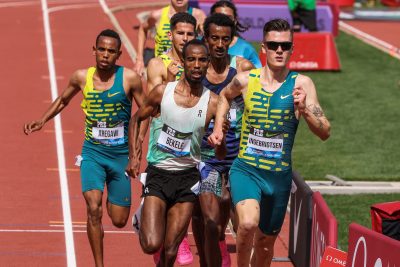Jakob Ingebrigtsen Wants It All: “If Some People Can Do Something, I Believe I Can Do It Better”
By Jonathan GaultLast weekend in Eugene, Jakob Ingebrigtsen wrapped his 2023 season with a double unprecedented in the history of distance running. On Saturday afternoon, Ingebrigtsen ran 3:43.73 to win the mile at the Prefontaine Classic, edging American Yared Nuguse (3:43.97) in an instant classic. Less than 24 hours later, he fought an even closer duel with Ethiopia’s Yomif Kejelcha, running 7:23.63 to Kejelcha’s 7:23.64 to win his second Diamond League title of the weekend.
On their own, either of Ingebrigtsen’s performances would have been historic. No one has run as fast in the mile or 3,000 since the 1990s, and Ingebrigtsen now occupies spot #3 on the all-time list at both distances. Ingebrigtsen said that when he left for his shakeout at 6 a.m. on Sunday morning, his legs felt better than expected — perhaps because, in 2023, every professional runner is able to recover more quickly thanks to foam-packed super spikes. But running 55.6-second pace for four laps still takes a toll; after a couple laps of the 3,000 meters, Ingebrigtsen said he could feel the 3:43 in his legs. Nevertheless, he was committed not just to running a fast time, but to doing so from the front of the pack, dragging six of the top seven finishers to personal bests.
“I could have been easier on myself and probably just laid back and just tried to win,” Ingebrigtsen said. “But that’s not my way of racing.”
In 2023, Ingebrigtsen’s way of racing produced one of the greatest seasons by a male distance runner in many years (for this exercise, we’re excluding the 800). Of course, the definition of greatness depends on what you value. Joshua Cheptegei broke world records at 5,000 and 10,000 meters in 2020, but barely raced beyond that due to COVID. Mo Farah swept the 5,000/10,000 meters at four straight global championships from 2012 through 2016 but could never dream of the sort of times Ingebrigtsen has put up this year. Bernard Lagat did what Ingebrigtsen could not and won the 1500 and 5,000 at the 2007 Worlds, but he was beaten seven times that year — including a 3rd-place finish in the 1500 at USAs.
For start-to-finish dominance and fast times across an entire season, you’d have to go back to the mid-2000s — Kenenisa Bekele in 2004 (double World XC gold, world records in the indoor 5k, outdoor 5k, and outdoor 10k, Olympic 10k gold) or Hicham El Guerrouj in 2002 (undefeated in 12 races, with best times of 3:26.89, 3:26.96, 3:27.34, and 3:29.27) to find a year that compares to Ingebrigtsen’s 2023. Here’s what he accomplished:
- World records at 2000 meters (4:43.13) and two miles (7:54.10)
- Fastest mile since 1999 (3:43.73, #3 all-time) and fastest 3,000 since 1999 (7:23.63, #3 all-time)
- Fastest 1500 since 2015; Ingebrigtsen’s 3:27.14 season’s best is the eighth-fastest time ever run and makes him the fourth-fastest performer ever
- Just the second man to break 3:30 five times in one year (3:27.14, 3:27.95, 3:28.72, 3:29.65, plus 3:28.76 en route in the mile at Pre; El Guerrouj broke 3:30 five times in 1997 and 2001 and six times in 1998 and 2002)
- Just the third man to break 3:28 more than once in the same year (Noureddine Morceli did it twice in 1995 and El Guerrouj did it twice in 1998 and three times in 1999 and 2002)
- Diamond League titles in the mile and 3000 meters (first man to ever win DL titles in two different distance events in a career — let alone the same year)
- Season record of 12 wins and 1 loss
- Eight Diamond League wins (seven of them in DL points events)
- Second straight 5,000-meter world title
- Second straight World Championship 1500-meter silver medal
Yet when Ingebrigtsen was asked after the race on Sunday whether he had accomplished most of the things he wanted in 2023, he paused. This is typical of Ingebrigtsen, who rarely rushes into an answer. After a beat came his response: no.
Obviously the gold in the 1500 is missing. But what else?
“No, that’s it,” Ingebrigtsen said.
Three weeks later, that defeat to Josh Kerr in the World Championship 1500-meter final still stings. It was not just that Ingebrigtsen lost, or that, for the second year in a row, he was run down by a Brit over the final 200 meters. Head-to-head results and world records matter to Ingebrigtsen, but what matters most is reaching his potential. Ingebrigtsen, who said he was sick during the World Championships, feels he did not do that in Budapest.
“It’s a good race, perfect for me, but just if you’re not 100% first, it’s frustrating not being able to get out your best,” Ingebrigtsen said.
***
Jakob on double-threshold training: “You would probably be – not stupid – but ignorant if you didn’t”
The National Football League is often described as a “copycat league” — when one team starts to find success running a specific scheme, pretty soon half the league will be incorporating the same ideas. Distance running does not offer the same opportunities for creativity as the NFL, but a similar concept applies. When a 20-year-old Norwegian becomes Olympic champion in the 1500 meters utilizing a revolutionary training approach, you can bet other coaches and athletes are going to see if double threshold works for them.
The interesting thing is that the self-coached Ingebrigtsen — who learned double threshold from his father, Gjert (who stopped coaching Jakob at the start of 2022), who in turn learned it from two-time Olympian Marius Bakken — is not opposed to others copying the system.
“You would probably be – not stupid – but ignorant if you didn’t [try it],” said Ingebrigtsen. “Because it’s definitely a very effective way of getting better at running. But it’s like in every aspect of life, there’s a lot of roads to take at becoming a good runner or even good at anything. It’s a lot of practice and consistency. That’s the most important thing.”
Ingebrigtsen will even go so far as to offer advice to those attempting to replicate his training. For eight months of the year — October to May — Ingebrigtsen’s training largely follows the model laid out by Bakken in his 2022 manifesto: two double-threshold sessions a week, one day of hill work, and a high overall volume of running (110-120 miles per week). Ingebrigtsen tweaks the training during competition season, and while he keeps most of the workouts to himself (he did reveal his key session before his 2-mile world record in June), he does not mind sharing broader principles.
While Ingebrigtsen prides himself on his high mileage during base training — he estimates he runs 30% more miles than his main rivals in the 1500 — he is not a slave to it during the summer. Building that base during the winter and spring — “filling the cup,” as Ingebrigtsen says — is crucial, but the benefit of that enormous base is that it provides flexibility when designing training during the racing season.
“For me, it’s not important to do as much mileage as I can because I have a lot of experience,” Ingebrigtsen said. “And my setup going backwards from the competition, I know what I need to do in order to feel the way I feel confident in. It’s a lot of up and down. In some periods in the middle of the summer, you can do a little bit more mileage because it’s maybe four, five, six weeks until the next competition. That’s probably where most people get wrong with doing our training is they believe that they always need to do the high amount of mileage to be able to do the things we’re doing.”
***
Two down, many more to go
Before his double at Prefontaine, Ingebrigtsen revealed to Norwegian newspaper VG his desire to break the world record at every distance from 1500 meters through the marathon (and yes, that includes the steeplechase — remember, Ingebrigtsen ran 8:26 as a 16-year-old before focusing on flat events). After the meet, he explained that desire to chase every record with a badass quote that gets to the essence of Jakob Ingebrigtsen.
“If some people can do something, I believe I can do it better,” Ingebrigtsen said. “That’s just my way of thinking and my way of staying motivated.”
No world record is easy, but some are easier than others. Ingebrigtsen set the world indoor record at 1500 meters last year and in 2023 earned his first two outdoor records in two rarely-run distances, the 2000 meters and two miles (the latter, technically a “world best”).
Now comes the hard part. Based on his current personal bests, Ingebrigtsen is far closer to the 1500 and mile records than the 5,000 or 10,000 (a distance he has never raced) but he believes the shorter events will be the most difficult records for him to break. His 3:27.14 pb at 1500 is 1.14 seconds off El Guerrouj’s 3:26.00 world record, while his 3:43.73 is .60 off the 3:43.13 mile world record — a margin Ingebrigtsen still believes to be significant.
“For me, definitely the faster the pace is, the harder it is, because I’m more aerobic-based obviously,” Ingebrigtsen said. “The slower it is, it’s more just training specifically towards running a longer period of time. I’m not going to say it’s easy, but it’s just about practice.”
And then there’s the marathon. A decade ago, the idea of the Olympic 1500-meter champion one day challenging the marathon world record would have seemed utterly ridiculous. And it is still hard to imagine Ingebrigtsen running faster than 2:01:09 — or whatever the world record is when he makes his marathon debut. The fastest anyone not born in Africa has ever run the marathon is 2:04:51.
Hard, but not impossible. In recent years, we’ve seen a number of runners challenge long-held assumptions about specialization in distance running. Mo Farah ran 3:28 for 1500 meters, then won the Chicago Marathon three years later. Genzebe Dibaba ran 3:50 for 1500 and 2:18:05 for the marathon. This year, Sifan Hassan defeated one of the strongest marathon fields in history in April and won a World Championship medal at 1500 four months later. Ingebrigtsen is untested beyond 5,000 meters on the track (he has won two Euro XC titles at 10k), but if any man from his generation possesses similar range, it is likely to be him.
When asked whether he would try to become the first man to run under two hours under legal conditions, Ingebrigtsen said it would be “a lot of fun.” But he’s not a fan of speculation.
“I don’t really enjoy talking about what could be because it’s easier to do it.”
Did you enjoy this article? Then you’ll enjoy hearing Ingebrgitsen talk to us on Sunday below:
Talk about Ingebrigtsens dreams on our world-famous fan forum / messageboard: MB: Jakob Ingebrigtsen wants ALL of the WRs – 1500 through marathon: “If Some People Can Do Something, I Believe I Can Do It Better”.


